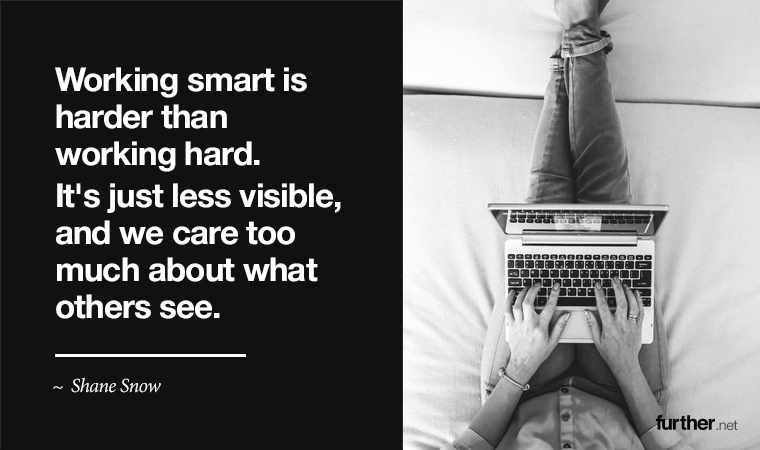
further: feature
Working too hard is not good for us, and we know it. Ramifications ranging from burnout to dangerous levels of life-shortening stress are well known, and yet we often toil away at our desks regardless.
And then research provides the bitter irony – the longer hours you work, the lower your productivity. Anything above 50 hours a week generally provides diminishing returns.
The data further shows that the output of working around 56 hours was exactly the same as 70 hours, meaning those extra 14 hours were a complete waste of life. This is likely even more pronounced for work that is self-directed and requires intellectual engagement, which is most likely the kind of work you do.
Now, at times, working long hours is unavoidable. But it’s funny how the “badge of honor” that we wear so proudly – the “I’m so busy” thing – begins to define us.
Instead of an occasional necessary evil, working long hours becomes a form of social cachet. Being “busy” implies hard work, good character, and success, whether you’re actually happy or doing work that matters.
So, are you actually producing meaningful output with all those long hours? Or are you merely creating the perception of hard work in the eyes of others?
This three-step process is for people who are less concerned with how long they’re seen at their desk, and more interested in getting important things done. And it depends just as much on not working as it does on focused attention.
1. Identify
It’s said that if you treat every task as equally important, nothing is important. The quickest way to work smarter is to complete the most important tasks first, in order of pre-determined priority.
Forget the standard to-do list. Instead, block off time on your calendar for each task that needs to be done, from most important to least throughout the day. This approach guarantees the highest return on time invested, even if you don’t get every item done.
2. Sprint
The next step is to work on those prioritized tasks in a focused, purposeful manner. So, for whatever period of time you have blocked off for a task on your calendar, that is all you do, without exception. Use a timer to alert you when the particular work sprint is over.
How long should each block of time be? Research suggests that 52 minutes is the optimal amount of focus time. Other people go for 90 minutes based on what’s known as our ultradian rhythm. Meanwhile, the Pomodoro method encourages shorter bursts of 25 minutes.
3. Break
No matter the duration of your focused work period, the essential aspect of this process is that you must then take a break. Get up and take a walk, read a book for pleasure, doodle, meditate, take a nap … whatever you want, as long as it’s not work.
Studies show that breaks help us maintain focus, solve problems, absorb and retain new information, and reevaluate the goals and processes that we’ve been working on. While to others it may appear that you’re “slacking off,” you’re actually priming yourself for a level of output that simply wouldn’t be attained by slogging it out.
Life is a Series of Sprints
Beyond the day-to-day, you can structure larger blocks of time with this same structure if you are fortunate enough to work outside of the confines of traditional employment. For example, entrepreneur Sean D’Souza takes three months off every year, broken into several breaks after intense work intervals.
Some people say life is a marathon, which brings to mind a long painful ordeal to be endured. I much prefer a series of sprints, with glorious breaks in between to relax, reflect, and get ready for the next race.
Further exploration:
- Proof that you should get a life
- To Work Better, Work Less
- Millionaires Don’t Use To-Do Lists
- The Rule of 52 and 17: It’s Random, But it Ups Your Productivity
- The Science of Taking Breaks at Work
Yikes, I’m coming up on a break. I’ve got to finish this sentence before the buz …
further: health
If You Just Ignored the Feature Article …
“There are steps you can take to minimize the damage of pulling an all-nighter, and treat your body (and brain) as well as possible under bad circumstances. Here’s how to survive the night—and recover ASAP.”
The Healthiest Way to Pull an All-Nighter
further: wealth
The Art of Humble Bragging
“It may not come easy, especially if you are humble or quiet by nature, but there are times in your career when you’re going to have to step out of the shadow of politeness to shout about your abilities and achievements.”
The Braggart’s Dilemma: How to Promote Yourself Without Being a Jerk
further: wisdom
The Wisdom of Leaving the Crowd
“Looking back, quitting social media is a no brainer. In retrospect it’s patently obvious that such services are little more than a huge time waster.”
One Year Without Social Media
__________
Thanks for being here, I hope you have a great week. If you’re so inclined, you can make my week a little better by ignoring that last article and sharing Further on your favorite social network:
Keep going-
Brian Clark
Tour Guide
Further
